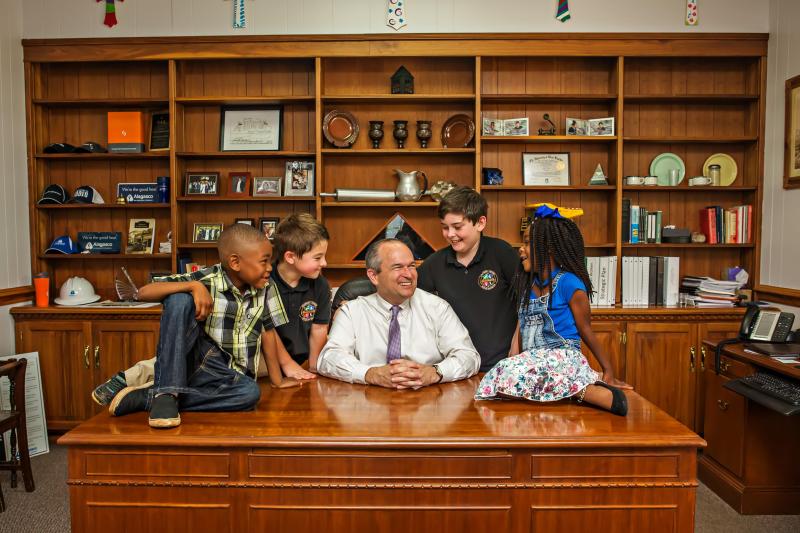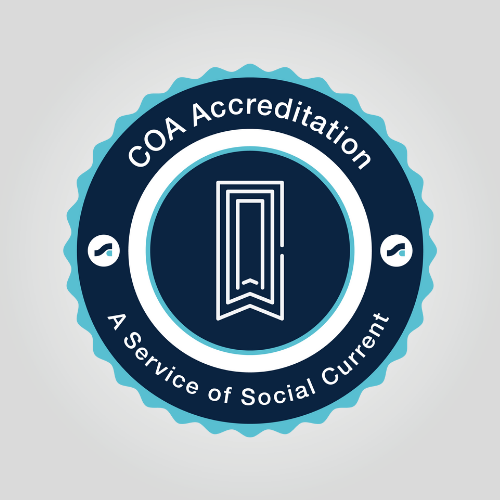Profiles in Accreditation: Ranch Ehrlo Society
Welcome to the Council on Accreditation (COA) blog post series Profiles in Accreditation!
The organizations that COA accredits are diverse in both the communities they serve and their reasons for seeking accreditation (or reaccreditation). Profiles in Accreditation will explore the accreditation experience through the perspective of these organizations. Through them, we can discover the value of accreditation, best practices, lessons learned, and recommendations.
Organization profile
Name: Ranch Ehrlo Society
Locations: Regina, Prince Albert, Moose Jaw, Fort Qu’Appelle, and the Rural Municipalities of Edenwold, Corman Park, and Buckland, Saskatchewan, Canada
First accredited: 1977
Reaccredited: 2019
Snapshot: Ranch Ehrlo, a non-profit organization, was founded by the late Dr. Geoff Pawson in 1966. It started as a single residential unit for six troubled boys and grew to a multi-service agency that serves thousands every year. Ranch Ehrlo offers a wide range of accredited mental health and developmental services on campuses located in and around Regina, Saskatoon, and Prince Albert, in the Canadian province of Saskatchewan. Its services include assessment and psychotherapy for members of the broader community, family treatment and reunification, early learning, vocational training, emergency receiving services, treatment foster care, affordable housing, residential treatment and education for children and youth with mental health and addictions needs, residential care for older adolescents and adults with pervasive and complex developmental disorders, and community recreation and sports programs for at-risk youth. Clients are referred to Ranch Ehrlo from across the country.
Ranch Ehrlo’s mission isto provide quality preventative and restorative services to, and advocacy for, vulnerable individuals and families through highly engaged and professional employees. Itenvisions communities where all individuals and families achieve their full potential.
Ranch Ehrlo is guided by the CARE model, Children And Residential Experiences: Creating Conditions for Change. Developed by Cornell University, CARE is a multi-level program aimed at improving services for children and youth in care. Based on six guiding principles (developmentally focussed, family involved, relationship based, trauma informed, competence centred, and ecologically oriented) the CARE model is designed to significantly influence the way professionals work with children.
Interview with Ranch Ehrlo Society
For this Profiles in Accreditation post, we asked Ranch Ehrlo President and CEO Andrea Brittin to share her experience of the COA accreditation process at a large organization that dedicated itself to becoming accredited not because of a mandate, but because of a passion for best practices. Ms. Brittin emphasized how accreditation has encouraged growth and enhanced cohesion across the agency.
* * *
COA: Why was seeking initial accreditation important for your organization?
AB: In the early 1970’s, Ranch Ehrlo Society sought to obtain accredited membership with the Child Welfare League of America (CWLA) to assist in the development of sound policies, procedures, and standards of practice. As the CWLA was one of the founding members of COA, it was a natural progression for us to seek accreditation from this body to validate our effectiveness and keep abreast of the latest in research and best practice.
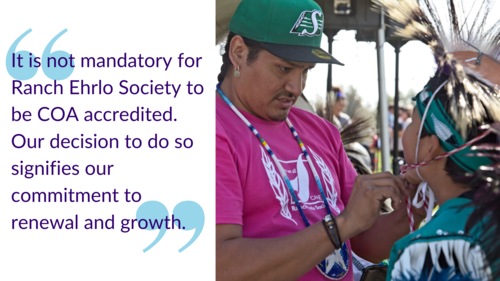
COA: What were some of the drivers for seeking reaccreditation?
AB: Ranch Ehrlo Societystrongly believes that maintaining best practice, as well as continual self-assessment, aids quality improvement and rejuvenates the agency. This benefits both those we serve and agency personnel. Undergoing the process of reaccreditation demonstrates that we, as an organization, continue to effectively manage our resources, allowing us to accomplish our goals. The reaccreditation process is one of many strategies we use to assist in stabilizing, measuring, and validating our effectiveness, ensuring that we are kept highly informed of the latest research and practice in the human services field. Our organization has grown exponentially since we were first accredited more than 40 years ago, so it is essential to have a method of review in place to be sure all elements are functioning smoothly.
COA: What about the COA accreditation process made you decide to partner with us?
AB: For clients and participants, COA accreditation demonstrates:
- Best practices carried out by appropriately trained staff.
- Client participation in their own service planning.
- A safe and respectful environment.
- Privacy protections of their confidential information.
- Positive outcomes.
- Cultural competence.
For employees, it demonstrates:
- Focus on health and safety with minimized risks.
- Efficient, effective, and supported environments. Defined professional staff qualifications. Performance evaluation and employee development in a culture of excellence.
For the board, it demonstrates:
- Sound financial management.
- Ethical practices.
- Current, relevant, and monitored strategic plan. Effective performance, quality improvement and risk management systems.
- Policies and procedures address pertinent issues.
For Funders and Referral Agencies, it demonstrates:
- Validation of high-quality services.
- Sound financial practices.
- Performance and quality improvement.
- Efficient organizational operations.
- Effective risk management policies.
COA: Were there any unexpected results after completing the Self Study and PQI process?
AB: We are very proud that COA standards and expectations have been engrained in the fabric of Ranch Ehrlo Society. New quality improvement initiatives, process developments, or procedure amendments are not undertaken “for COA”. These tasks are welcomed, as they are a testament to the value the agency places on continuous improvement. Although self-examination is not always simple, especially when obstacles are presented, the agency has learned to relish the challenge, with the solid best-practice framework and support COA offers. Comfort with self-reflection is an organizational shift from previous accreditation cycles.
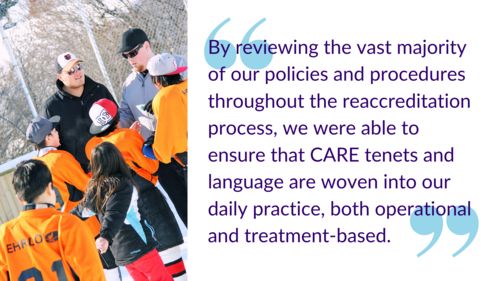
COA: How did you engage and communicate the value of accreditation to the entire organization during the accreditation process?
AB: A team of subject matter experts was appointed to each of the 21 sections/sub-sections of standards assigned to Ranch Ehrlo. These teams, in tandem with the quality improvement department, examined the standard implementation required and orchestrated the collection of evidence. This approach allowed investment in the process by a greater population of personnel.
Throughout the year leading up to the Self Study submission and Site Visit, communication to agency employees was ongoing. Emails, website stories, standing agenda items at departmental or program meetings, etc.–all worked simultaneously to ensure staff were informed and engaged.
All agency employees, regardless of position, program, or location, had the opportunity to partake in the process. There are various ways this occurred – from composing a written narrative, to offering input for policies in development, to being informally interviewed or observed during the Site Visit, to learning about the process through agency communications. This provided a sense of ownership in the agency’s intentions and functioning.
COA: What do you see as the main benefit of COA accreditation?
AB: We at Ranch Ehrlo strongly believe that adhering to best practices, as well as continual evaluation, helps us enhance our services for the young people, adults, and families we serve. For that reason (and many more), we choose to pursue accreditation as a means to periodically and thoroughly review EVERYTHING we do. It is not mandatory for Ranch Ehrlo Society to be COA accredited. Our decision to do so signifies our commitment to renewal and growth. COA offers extremely thorough training, documentation, and support throughout the process, so, although accreditation is a great deal of work, guidance was always available.
COA: What about the accreditation process do you feel was most valuable to your organization?
AB: The self-study process is always a valuable opportunity for reflective practice and learning. In the past, it has proven so impactful and valuable for staff to hear the comments of Peer Reviewers at the Exit Meeting, and to read about strengths and areas for improvement in the Final Accreditation Report.
Also, Ranch Ehrlo Society has been in the process of implementing the CARE (Child and the Residential Experience) Model of treatment over the last two years. All agency employees, regardless of role, tenure or location, have been or will be trained in the model, and continual training is offered to direct-care staff. By reviewing the vast majority of our policies and procedures throughout the reaccreditation process, we were able to ensure that CARE tenets and language are woven into our daily practice, both operational and treatment-based.
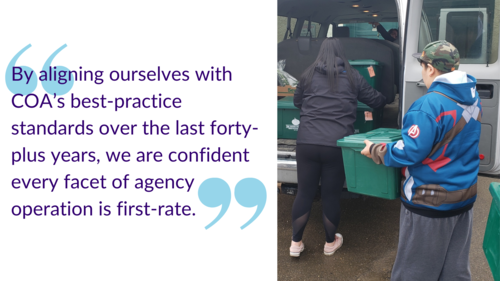
COA: What did you like most about the accreditation process?
AB: It is a collaborative process that requires numerous departments, programs and personnel to work closely to review policies and procedures and to evaluate the degree of standard implementation. By engaging collectively with colleagues, a cross-section of staff from a variety of areas were reviewing information, so processes were examined more thoroughly and under a variety of lenses. This led to a greater understanding and appreciation of the organizations’ functioning, allowing for enhanced cohesion.
The Site Visit was also extremely beneficial, as it provided real-time advice and feedback from the Peer Reviewers and gave employees a face-to-face connection with COA. The visit allowed us to demonstrate our successes, but we were also not afraid to have our challenges highlighted. This truly allows for reflective practice and growth.
COA: What was the biggest challenge during the accreditation process?
AB: Ranch Ehrlo Society is a large organization, with close to 900 employees working in dozens of programs and locations across the province of Saskatchewan. We were assigned 21 different sections of standards and submitted over 1000 documents for our Self Study. There was a great deal of organization and communication required to coordinate review teams and evidence.
COA: How has COA (re)accreditation impacted operational success?
AB: Ranch Ehrlo Society firmly believes that accreditation improves the overall quality of care for those we serve. By aligning ourselves with COA’s best-practice standards over the last forty-plus years, we are confident every facet of agency operation is first-rate. COA has given us the opportunity to strengthen our continuous improvement efforts and enhance our programming, while establishing a highly-competent workforce and supporting our mission. The process makes us more cognizant of proactively reviewing and, if required, revising policies and procedures and other agency operations.
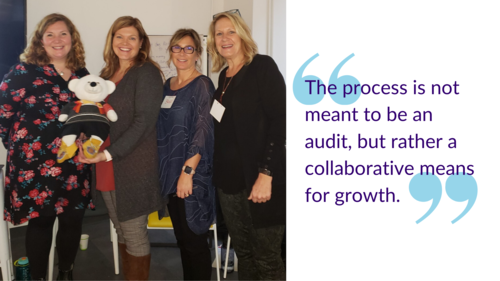
COA: What are the top three pieces of advice or tips that you would give to an organization considering or currently undertaking the accreditation process for the first time?
AB:
- Be sure to give yourself PLENTY of time to prepare for each phase of the process. Some required documentation or processes will already exist, but many others will have to be revised or created. Set due dates well in advance of final submission deadlines. It may take much longer than you anticipate preparing evidence and implement procedures. Carve out time in your daily calendar to complete COA-based tasks. This will keep you on schedule.
- Thoroughly review the standards prior to beginning the implementation review and document collection process, noting where information is required from a cross-section of departments. For example, the Residential Treatment Services Standards (RTX) may be the focus for employees working in those programs, but they will likely require collaboration with Human Resources for staffing lists, training information, etc. This will avoid scrambling for evidence when due dates approach.
- Depending on the size of your organization, the Stakeholder Survey process may be a much larger project-within-a project than anticipated. Collecting the contact information and engaging the assistance and input of hundreds of stakeholders across the country was a challenge for our agency.
COA: Are there any other learnings or insights that you’d like to share?
AB: Fully embrace the accreditation process. It is not easy, and it extremely time consuming, but it is all worth it in the end. Delve into the COA-offered trainings, both in-person and online and connect regularly with your accreditation coordinator with COA. The process is not meant to be an audit, but rather a collaborative means for growth in an organization. Do not be afraid to highlight areas of challenge or where improvement is required. That is the intention of the process. No organization is perfect, but accreditation can assist each organization in living up to their full potential.
Thank you, Ranch Ehrlo Society!
We would like to express our gratitude toward Ms. Brittin for her inspiring insights and tips and acknowledge the entire Ranch Ehrlo team for embracing accreditation and collectively contributing to the promotion of best practices. Thank you, all!
Do you have a COA accreditation story to tell? Click here to share it. You could be the next organization we feature!


